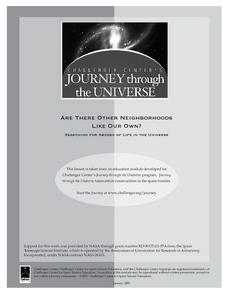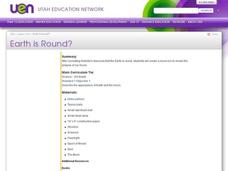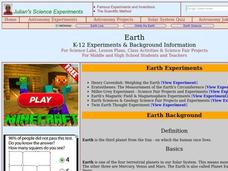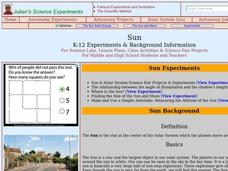Space Awareness
The Climate in Numbers and Graphs
Weather versus climate: weather relates to short time periods while climate averages the weather of a period of many years. Scholars learn about average temperature and precipitation in various climate zones and then apply statistics...
Space Awareness
Valleys Deep and Mountains High
Sometimes the best view is from the farthest distance. Satellite imaging makes it possible to create altitude maps from far above the earth. A three-part activity has your young scientists play the role of the satellite and then use...
Curated OER
How Are Stars Like People?
A beautifully written lesson plan delves into a beautiful topic: stellar population. Engage aspiring astronomers with activities that examine human populations and then transition onto the stars of the universe. Data and photographs for...
Curated OER
Star Search
Seventh graders explore stars. In this star lesson, 7th graders apply generalities about space objects to constellations and explore the differences between radio waves and light waves by answering essential questions in their research.
Curated OER
Deep Impact Comet On A Stick
Students investigate the concept of a comet. They construct a model of a comet. The design is done using the same thoughts of an engineer. Students work together to discuss the strengths and weaknesses of the comet models. If the model...
Curated OER
Modeling the Big Bang and the Formation of the Universe
Sixth graders conduct an experiment to understand the Big Bang Theory. In this Big Bang Theory lesson, 6th graders will observe a balloon with confetti popping to emulate and analyze information related tot he Big Bang theory. Students...
Curated OER
Pulsar Stars And Black Holes
Learners explore the discovery of pulsar stars, and the characteristics of pulsar stars. Theories and ideas behind black holes are discussed. The issues of women's historical role in science are also touched on.
Curated OER
Project SETI.
Tenth graders study how to search for life in outer space and make use of the 40-foot radio telescope at Greenbank, West Virginia. Request that the telescope be pointed at a particular location and time and receive data back from it...
Curated OER
Are There Other Neighborhoods Like Our Own?
Learners investigate the possibility of life existing on other planets. They conduct research using a variety of resources. The lesson includes an overview that is used for classroom discussion practices. They tell the teacher how to...
Curated OER
The Drake Equation
Students use the Drake Equation to calculate the probability of sustaining life on various planets. Through the use of the equation, they determine whether intelligent and advanced civilizations can be developed on planets other than...
Curated OER
Earth is Round?
Third graders discuss how Aristotle concluded that the Earth was round. As a class, they review theories about the Earth's shape and describe how life on Earth would be different if it were flat. Individually, they make a moon book in...
Curated OER
Earth
Students study the earth in relation to the solar system. In this planetary lesson plan students complete several investigations into the measurement of the earth and its magnetic field.
Curated OER
Sun
Learners study how the sun is at the center of the solar system. In this solar lesson students measure the altitude of the sun and its size.
Curated OER
The Tides
Students experience a computer based applet that explains why the Earth experiences tides.
Curated OER
Kepler's Second Law
Students explore orbital velocities and how they vary along each orbit, according to Kepler's Second Law.
Curated OER
Habitable Zones
Students focus on stellar luminosities to estimate size of habitable zones, map out habitable zone around hot light bulbs that serve as models of stars, investigate how size of model "habitable zone" around light bulbs depends on...
Curated OER
My Hometown
Learners identify the basic requirements needed for survival and identify the resouces needed for survival that are found within their own community. They use craft materials to create a model of it and then. create a color key to...
Curated OER
How Do We Explore Strange Environments?
Young scholars identify and label the different parts of a robot, rover, or a spacecraft. They discuss and record all of the features their robot will need to accomplish its mission and be able to explain why they chose these features...
Curated OER
What are Stars?
Young scholars research the solar system and it's characteristics. For this solar system lesson, students are broken into 4 groups, each assigned a specific part of the solar system. Young scholars use the Internet to research their...
Curated OER
Starquest
Students study the history and cultural interpretation of a celestial body or constellation. They create technology based presentations of the information.
Curated OER
Exploring The Neighborhood of the Solar System
Students explain why exploring the universe for life on other planets is an important field of study. They use mathematical formulas to calculate the temperatures of planets as it relates to their distance from the sun. Students use...
Curated OER
Da Vinci's Renaissance
Students study the Renaissance through an examination of the life and accomplishments of Leonardo Da Vinci.
Curated OER
Working on the Moon
Students take a mission to the moon. In this space science lesson, students visit selected websites to discover information about Earth's moon and the solar system. Students may take virtual missions to the moon and share information...
Curated OER
Comparing the Satellite and Broadcast Radio Landscapes
High schoolers research the development of satellite technology over the last 50 years students explain how the enactment of the Telecommunications Act of 1996 changed the rules for corporate ownership of multiple media outlets.

























